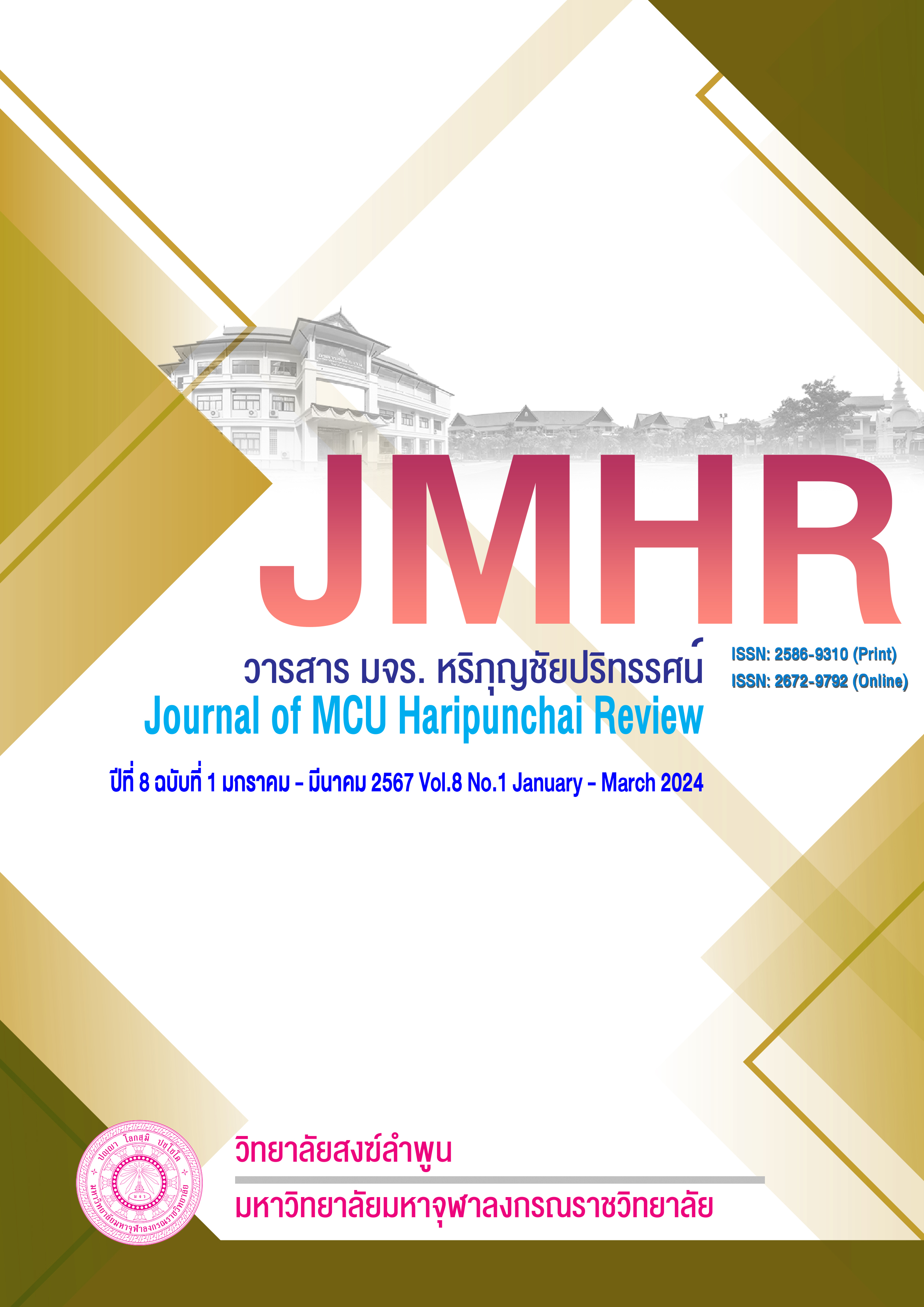Application of Papanikadhamma for Leadership Development of Sub-District Headman,Village Headman in Chaiwattana Sub-District, Pua District, Nan Province
Main Article Content
Abstract
Objectives of this thesis were : 1) To study the level of people's opinions towards the leadership of Sub-District headman, village headman at Chaiwattana Sub-District 2) To compare people's opinions on the leadership of Sub-District headman, village headman at Chaiwattana Sub-District classified by personal factors. and 3) To applying Papanika-dhamma for leadership development of Sub-District headman, Village headman at Chaiwatthana Sub-District. The methodology was the mixed methods. The quantitative research, by survey method, collected data from samples who were people living at Chaiwatthana Sub-District by using the random sampling method using Taro Yamane's formula, obtained 366 samples derived from the population of 4,208 people. Data were analyzed by finding frequency, percentage, mean, and standard deviation. The hypothesis was tested using one-way analysis of variance. ANOVA. The qualitative research, data were collected from 10 key informants by in-depth interviewing and analyzed data by content descriptive interpretation, presented in descriptive form of frequency table, using data to support the quantitative data.
Findings were as follows:
1) The leadership of Sub-District headman, village headman at Chaiwatthana Sub-District, by overall, was at high level.
- The comparison of the level of people’s opinions on the leadership of Sub-District headman, village headman at Chaiwatthana Sub-district classified by personal factors, was found non-different, rejected the set hypothesis. For the people with different ages, occupations and incomes had different opinions on the leadership of Sub-District headman, village headman at Chaiwatthana Sub-district accepted the set hypothesis.
- Guidelines for applying the principles of the Papanika-dhamma for leadership development of Sub-District headman, village headman at Chaiwatthana Sub-District were that: 1) Cakkhuma: being a person with a wide vision, Sub-District headman, village headman should determine the direction of their operations by emphasizing on the participation of the people with far-sighted vision and thoughtful and rational thought process 2) Withuro: being an expert in the work of Sub-District headman, village headman, should be fully responsible for the assigned mission, To solve problems that arise in a timely manner, to have expertise in their work and to have specific expertise for managing people, resources and community. 3) Nissayasampanno: being a good interpersonal person and being trusted by others. Sub-District and village headmen should be good friends with colleagues and the people. To have good interpersonal skills in coordination and to be good coordinators who aimed to build good relationships with people in the community.
Article Details

This work is licensed under a Creative Commons Attribution-NonCommercial-NoDerivatives 4.0 International License.
References
กิติ ตยัคคานนท์. (2530). เทคนิคการสร้างภาวะผู้นำ. (พิมพ์ครั้งที่ 2). กรุงเทพมหานคร : เชษฐ์การพิมพ์.
กวี วงศ์พุฒ. (2539). ภาวะผู้นำ. (พิมพ์ครั้งที่ 4). กรุงเทพมหานคร : ศูนย์ส่งเสริมวิชาชีพบัญชี.
เขมิกา ทองเรือง. (2562). ภาวะผู้นำของกำนัน ผู้ใหญ่บ้านตามความคาดหวังของประชาชนเทศบาลตำบลนาคำ อำเภอศรีสงคราม จังหวัดนครพนม. วารสารเสลภูมิวิชาการ. 5(2) (กรกฎาคม -ธันวาคม 2562), 9-21.
พิชยุตม์ อินทะเสน. (2563). รูปแบบการพัฒนาภาวะผู้นำการเปลี่ยนแปลงของกำนันผู้ใหญ่บ้านใน ภาคตะวันออกเฉียงเหนือตอนล่าง. วารสารสันติศึกษาปริทรรศน์. 8(4) (กรกฎาคม – สิงหาคม 2563), 1294-1307.
พระธรรมปิฎก (ป.อ. ปยุตฺโต). (2546). ภาวะผู้นำ. กรุงเทพมหานคร : สุขภาพใจ.
พระปัญญา โชติธัมโม (แก้วหาวงค์). (2561). ภาวะผู้นำตามหลักปาปณิกธรรมของผู้บริหารเทศบาลเมือง ท่าเรือพระแท่น อำเภอท่ามะกา จังหวัดกาญจนบุรี. วิทยานิพนธ์รัฐประศาสนศาสตร มหาบัณฑิต. บัณฑิตวิทยาลัย, มหาวิทยาลัยมหาจุฬาลงกรณราชวิทยาลัย.
พระอธิการธนิต ธมฺมสาโร (รามโพ). (2562). ภาวะผู้นำเชิงพุทธของกำนัน ผู้ใหญ่บ้าน ตำบลห้วยร่วม อำเภอดงเจริญ จังหวัดพิจิตร. วิทยานิพนธ์รัฐประศาสนศาสตรมหาบัณฑิต. บัณฑิต วิทยาลัย : มหาวิทยาลัยมหาจุฬาลงกรณราชวิทยาลัย.
พระอภิรัตน์ ฐิตวิริโย (ดาประโคน). (2561). ศึกษาแนวทางการพัฒนาภาวะผู้นำเชิงพุทธของผู้บริหาร โรงเรียนมัธยมศึกษา อำเภอบางปะอิน จังหวัดพระนครศรีอยุธยา. วิทยานิพนธ์พุทธศาสตร มหาบัณฑิต. บัณฑิตวิทยาลัย : มหาวิทยาลัยมหาจุฬาลงกรณราชวิทยาลัย.
ราชกิจจานุเบกษา. (2552). พระราชบัญญัติลักษณะปกครองท้องที่ (ฉบับที่ 12) พ.ศ. 2552. กรุงเทพมหานคร : กรมการปกครอง.
ราชบัณฑิตยสถาน. (2556). พจนานุกรมฉบับราชบัณฑิตยสถาน พ.ศ. 2554 เฉลิมพระเกียรติ พระบาทสมเด็จพระเจ้าอยู่หัว เนื่องในโอกาสพระราชพิธีมหามงคลเฉลิมพระชนมพรรษา 7 รอบ 5 ธันวาคม 2554. กรุงเทพมหานคร: ราชบัณฑิตยสถาน.
ส่วนบริหารงานกำนันผู้ใหญ่บ้าน สำนักบริหารการปกครองท้องที่ กรมการปกครอง กระทรวงมหาดไทย. (2559). การประเมินผลการปฏิบัติหน้าที่ของผู้ใหญ่บ้านตาม ระเบียบกระทรวงมหาดไทยว่าด้วยหลักเกณฑ์และวิธีการประเมินผลการปฏิบัติ หน้าที่ของผู้ใหญ่บ้าน พ.ศ. 2559. กรุงเทพมหานคร : กรมการปกครอง.
สรายุทธ์ หอมจันทร์. (2563). ภาวะผู้นำของกำนันผู้ใหญ่บ้านที่ส่งผลต่อการบริหารราชการส่วนท้องที่ ในจังหวัดสุพรรณบุรี. วารสารรัฐศาสตร์ปริทรรศน์ มหาวิทยาลัยเกษตรศาสตร์. 7(1) (มกราคม –มิถุนายน 2563), 163 – 191.
Gibson, J.L., Ivancevich, J.M., & Donnelly, J.H. (1997). Organization Behavior Structure Process. New York : McGraw-Hill.
Earl J. Frierich. (1976). An Introduction to Political Theory. New York: Harper & Row Publishers.
Reddin, William J. (1970). The 3 – D Management Style Theory : Theory Paper 2. Canada : Social Science System.


